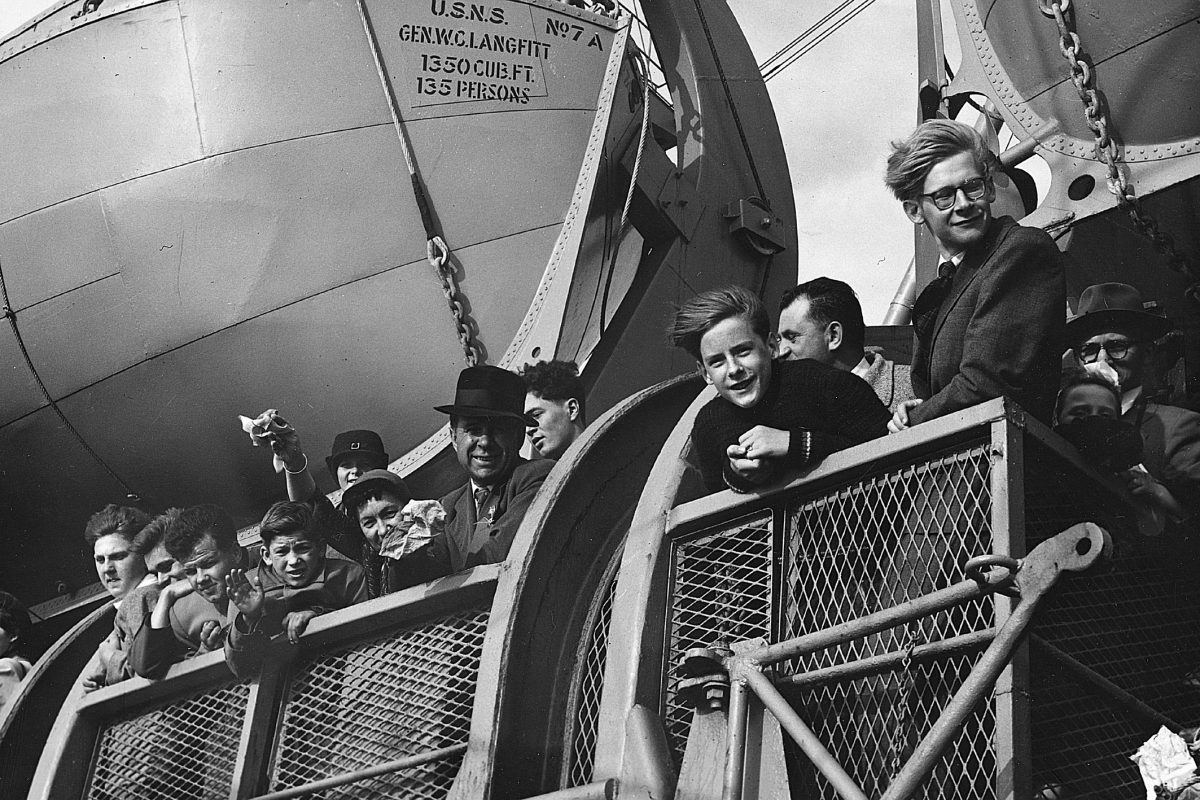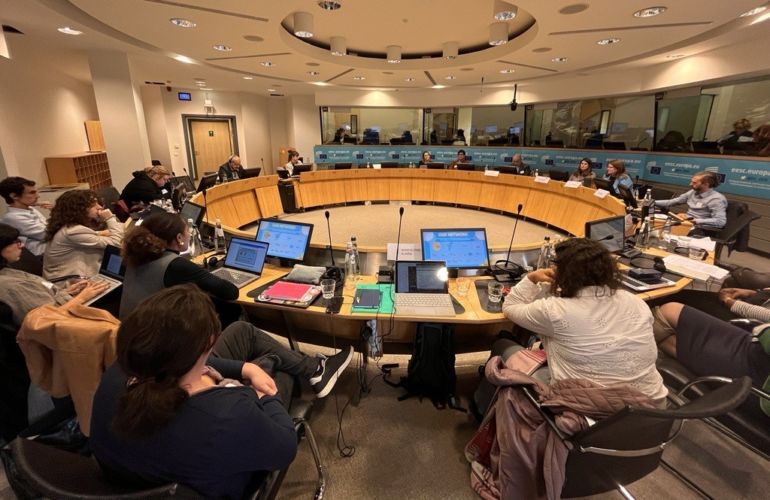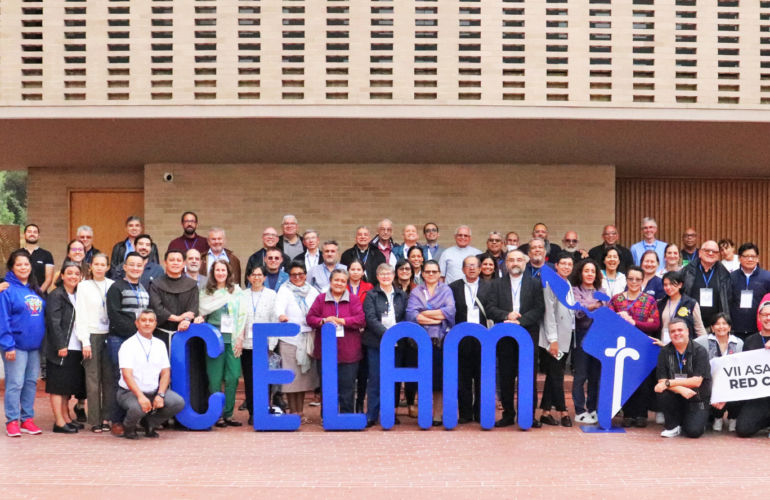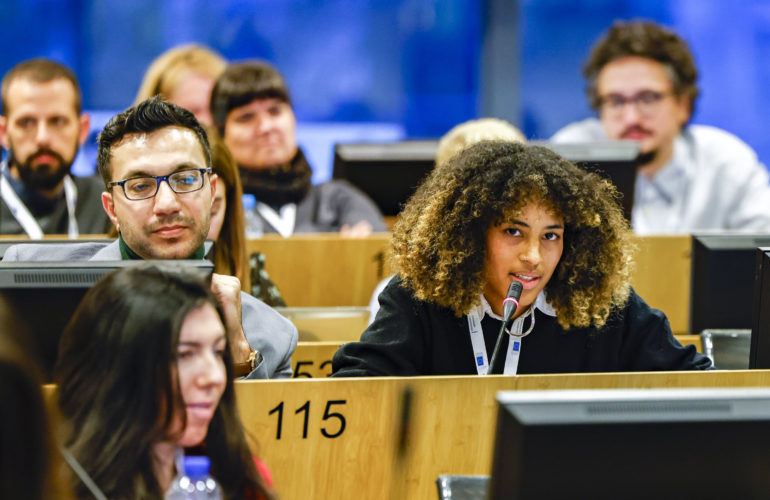Why I Know Migration Is a Positive Thing
Sometimes people ask me why I see migration as something positive. And I must admit, it mostly comes down to my personal experience.

By Msgr. Robert J. Vitillo*
My grandparents emigrated from Italy during the first decade of the 1900s, when more than eight million Europeans arrived on the shores of the United States of America. I know how hard they and their 14 children worked in the “land of opportunity” they saw in the USA. I also know how much they sacrificed to be sure that their grandchildren – among whom I proudly count myself – benefited from the education of which they were deprived.
Our family maintained the Catholic faith and many of the beautiful characteristics of Italian culture, especially its culinary genius. However, we also were able to contribute significantly to the country that welcomed my grandparents, including through the military service of my father, two uncles, and one aunt during World War II. My aunt, in fact, continued to serve in the U.S. Navy Nurse Corps during the conflicts in Korea and in Vietnam and eventually retired as the Assistant Director of the Corps. In the USA, refugees and migrants have contributed constantly to “making America great”.
Throughout the past 48 years of my priestly ministry, I have learned so much from migrants and refugees, thanks to my assignments in several Catholic Church-inspired organizations dedicated to their service. I have seen their strength and determination in the face of terrible persecution, suffering, abuse, exploitation, and deprivation. I have witnessed how they keep their spirit of hope and gratitude to God for always opening another door as soon as a previous door has closed. They generously share their culture and values and the little that they possess with anyone interested in knowing them better. Even here in Geneva, where I live now, I have assisted in a parish the majority of whose members come from all parts of the world, and so many of them inspire me each week and help to strengthen my own faith.
I also have been a migrant myself – in Italy for eight years and, more recently, in Switzerland for 15 years. I am grateful for the welcome I have received in these two countries. I realize that my migration experiences have been very privileged and “painless” compared to that of many other migrants and refugees. But, at times, I have faced discrimination and rejection for not speaking the language of my host countries well enough, for not understanding some of their unwritten rules, or for simply being a “foreigner”. These challenges helped me to better understand those faced by the migrants and refugees who frequently confront fear, rejection, discrimination and marginalization… not to mention the rising tendencies of nationalism in Europe and other parts of the world.
Today, there are some 80 million refugees and internally displaced persons in the world. We cannot ignore their needs; we cannot see them merely as an “issue”, or as a “problem.” We must meet them as “persons,” as Pope Francis frequently reminds us, both in his words and deeds.
That is on the macro level. But let us not forget the micro level at which individual migrants and their families are often forcibly separated, even imprisoned, blocked from claiming asylum or demonstrating the need for protection and welcome. Unlike the experience of my grandparents when they emigrated to the USA, hard work is not always enough to succeed. Many migrant populations in high-income countries are condemned to a permanent “underclass” situation on the economic, social and educational levels.
Let us also not forget that the vast majority of refugees and migrants remain without any “durable solution” in the countries where they first sought safety. They have no right to work in regular jobs; many of their children cannot go to school.
As Secretary General of the International Catholic Migration Commission, I have visited our programs in the field, and my heart breaks when forcibly displaced people beg me to solve their particular situations. I know that, despite our best efforts as ICMC, we cannot resolve all the obstacles to safe, voluntary and regular migration. That requires a truly global effort by multilateral organizations, governments, religious leaders and faith-based organizations and by all of civil society ― an effort like that proposed in 2018 by the Global Compacts for Migration and on Refugees. Sometimes, all ICMC can do is try to fill some immediate needs for these migrant and refugee families who seek our assistance, while also investing much energy and expertise into promoting structural solutions that can assure these families of a positive long-term future.
Forced Like Jesus Christ To Flee
Finally, for Catholics like myself, our faith ― inspired by Judeo-Christian roots in Sacred Scripture, the Social Doctrine of the Catholic Church, and two millennia of “welcoming the stranger” ― leaves no doubt about how we should treat migrants and refugees. All people on the move must be treated with respect and offered hospitality. The Old Testament tells us to receive migrants and travelers in a very special way, since they may be angels who are knocking on our doors. Jesus, too, instructed His followers that they would be welcomed into the Kingdom of Heaven if they welcomed the stranger, since, if we do it for these “least ones,” we do it for Him.
Today, there are some 80 million refugees and internally displaced persons in the world. We cannot ignore their needs; we cannot see them merely as an “issue”, or as a “problem.” We must meet them as “persons,” as Pope Francis frequently reminds us, both in his words and deeds.
This month, Catholics across the globe mark the World Day of Migrants and Refugees (27 September). This year, the Holy Father chose “Forced like Jesus Christ to flee” as its theme. In my view, he strongly encourages us to see Our Lord Jesus Christ in the faces, hearts and souls of migrants and refugees in today’s world. It may sometimes be easy to reject migrants as an abstract category, but can we do so when we take the time and effort to get to know them as real people, as families like our own, as brothers and sisters created in the image of God?
This year, the Holy Father has focused the Day principally on internally displaced persons. They constitute the largest group of forced migrants in the world. But, because they have not crossed an international border, they are not afforded the same protection as, for instance, those who are recognized as refugees in accordance with international law.
Let us hope that Catholics and all people of good will become more sensitive and actively responsive to internally displaced people! More sensitive and responsive, for instance, to those affected by the massive displacement taking place in Burkina Faso, where ICMC has just initiated a child protection program with our national member organization, the Migration Committee of the Burkina Faso Episcopal Conference.
And let us pray and do all we possibly can to improve international protection mechanisms for internally displaced people and encourage national authorities to protect them better and offer them development opportunities.
* Msgr. Robert J. Vitillo is Secretary General of the International Catholic Migration Commission



